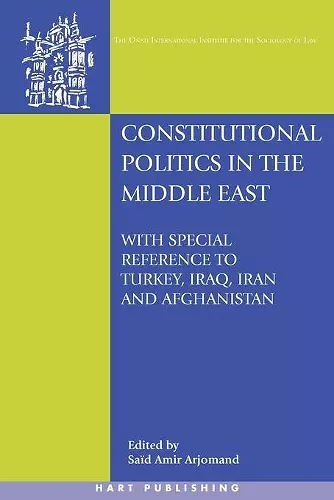Constitutional Politics in the Middle East
With special reference to Turkey, Iraq, Iran and Afghanistan
Format:Paperback
Publisher:Bloomsbury Publishing PLC
Published:17th Jan '08
Currently unavailable, and unfortunately no date known when it will be back

This book is the first comparative and interdisciplinary study of constitutional politics and constitution-making in the Middle East. The historical background and setting are fully explored in two substantial essays by Linda Darling and Said Amir Arjomand, placing the contemporary experience in the contexts, respectively, of the ancient Middle Eastern legal and political tradition and of the nineteenth and twentieth century legal codification and political modernization. These are followed by Ann Mayer's general analysis of the treatment of human rights in relation to Islam in Middle Eastern constitutions, and Nathan Brown's comparative scrutiny of the process of constitution-making in Iran, Afghanistan and Iraq with reference to the available constitutional theories which are shown to throw little or no light on it. The remaining essays are country by country case studies of Turkey, Afghanistan and Iraq, the case of Iran having been covered by Arjomand as the special point of reference. Mehmet Fevzi Bilgin examines the making and subsequent transformation of the Turkish Constitution of 1982 against current theories of constitutional and deliberative democracy, while Hootan Shambayati examines the institutional mechanism for protecting the ideological foundations of the Turkish Republic, most notably the Turkish Constitutional Court, which offers a surprising parallel to the Iranian Council of Guardians. Arjomand's introduction brings together the bumpy experience of the Middle East along the long road to political reconstruction through constitution-making and constitutional reform, drawing some general analytical lessons from it. He also shows the consequences of the fact that the constitutions of Turkey and Iran had their origins in revolutions, and those of Afghanistan and Iraq, in war and foreign invasion.
...both important and [welcome] because it sheds light on the murky spaces in the constitutionalism discourse and dispels many myths about Islam...By comparing Iran's constitutional experience with that of its neighbor, Afghanistan, Arjomand sharpens our understanding of the central questions of the role and potential of Islam in effecting social change...by insightfully capturing the complexity and challenges of constitution-making in the Middle East, the book lives up to its editor's hope that its topic indeed "deserves the same attention as other salient contemporary trends." Vijayashri Sripati Human Rights Quarterly Vol 30, 2008 ...the unique feature of this book is that it is one of the first, or even the first, which describes the constitutional development in a large variety of Islamic, Middle Eastern countries in a broad comparative perspective, highlighting peculiarities, similarities, and problems of the different legal systems...not only does the compilation give great insight into constitutional development in the region, but it also provides innovative parallels between various constitutional systems, which have scarcely been noticed...hitherto...it is highly advisable for anyone working on the public and constitutional law of the region to read this book. Ramin Moschtaghi European Journal of International Law Vol 20, No 2, April 2009
ISBN: 9781841137735
Dimensions: 234mm x 156mm x 11mm
Weight: unknown
222 pages